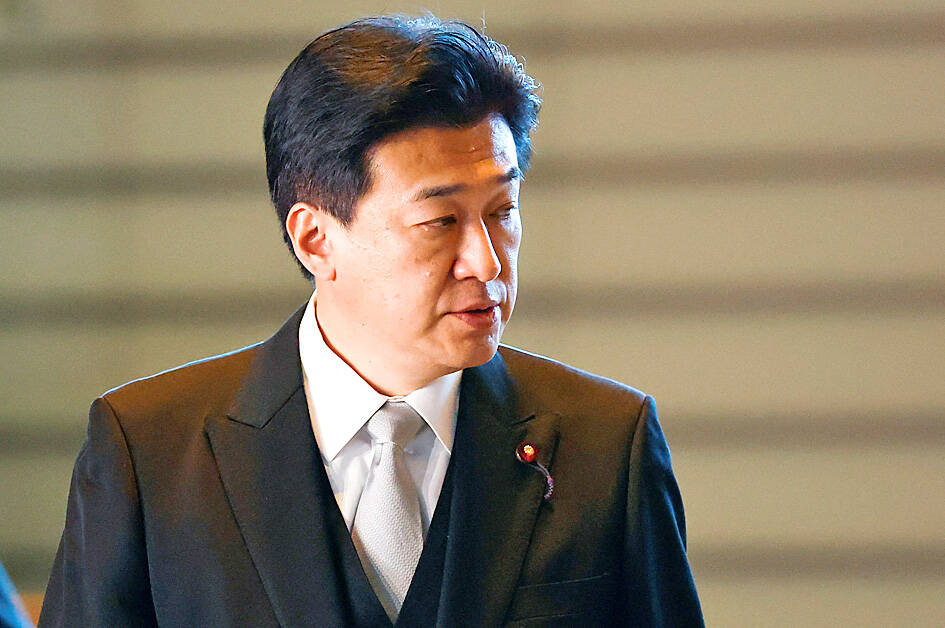Japanese Prime Minister Fumio Kishida has appointed as defense minister a politician who has worked to build ties with Taiwan, yesterday’s new Cabinet lineup showed.
The choice spotlights a stronger line on defense as Kishida battles sagging ratings with his term as leader of the ruling Liberal Democratic Party (LDP) set to end next year.
Japanese Chief Cabinet Secretary Hirokazu Matsuno said the role of minister of defense went to Minoru Kihara, a pro-Taiwan politician who has visited the nation and belongs to a Japan-Taiwan inter-parliamentary group.

Photo: Reuters
Kihara would oversee the bolstering of Japan’s military as part of a plan to double defense spending by 2027. He would have to solve the question of how to fund that buildup amid rising tensions in the region over China’s military expansion and maritime disputes.
Takashi Kawakami, a security expert and professor at Takushoku University in Tokyo, said the choice of Kihara as defense minister “isn’t an anti-China move, but it does indicate a closeness with Taiwan.”
“I do think this sends a message that Japan is seeking stability in Taiwan alongside the United States,” he said.
However, one political commentator said that such ministerial roles had diminished in importance in favor of dialogue with China at the highest levels.
“Around the world, summit diplomacy has become the mainstream,” said Shigenobu Tamura, who previously worked for the LDP. “Even if the foreign and defense minister posts change, there won’t be any change or impact on Japan’s diplomatic policy.”
The Cabinet shuffle comes as Kishida, who assumed office two years ago, has seen his popularity dip in recent months after a string of scandals, including data mishaps linked to government ID cards and the arrest of a vice minister under suspicion of bribery.
In related news, Japan has appointed a serving government official to act as its de facto defense attache in Taiwan, four sources said, elevating security ties in a move likely to anger China.
Japan handles bilateral relations through the Japan-Taiwan Exchange Association in Taipei, which is chiefly staffed by reassigned foreign and trade ministry officials. The defense attache role has until now been held by a retired Japan Self Defense Force officer to avoid antagonizing China.
He has been joined by an official dispatched by the Japanese Ministry of Defense to enhance information gathering and communicate with Taiwan’s military, said the sources, who asked not to be identified because of the sensitivity of the issue.
It is also “symbolic” of Japan’s support for Taiwan, said one of the people who know about the appointment. “Taiwan had been asking for an active duty defense official to fill the post.”
Highlighting Tokyo’s nervousness about Beijing’s reaction, the move was halted last year after a Japanese media report about the plan, the sources said.
The Japanese Ministry of Defense said that it would only pursue “non-governmental” ties with Taiwan.
In Taipei, the Ministry of Foreign Affairs declined to comment when asked about the new defense attache, but said it “would continue to deepen cooperation with similar-minded partners such as Japan.”
See Japanese on Page 5

DAREDEVIL: Honnold said it had always been a dream of his to climb Taipei 101, while a Netflix producer said the skyscraper was ‘a real icon of this country’ US climber Alex Honnold yesterday took on Taiwan’s tallest building, becoming the first person to scale Taipei 101 without a rope, harness or safety net. Hundreds of spectators gathered at the base of the 101-story skyscraper to watch Honnold, 40, embark on his daredevil feat, which was also broadcast live on Netflix. Dressed in a red T-shirt and yellow custom-made climbing shoes, Honnold swiftly moved up the southeast face of the glass and steel building. At one point, he stepped onto a platform midway up to wave down at fans and onlookers who were taking photos. People watching from inside

A Vietnamese migrant worker yesterday won NT$12 million (US$379,627) on a Lunar New Year scratch card in Kaohsiung as part of Taiwan Lottery Co’s (台灣彩券) “NT$12 Million Grand Fortune” (1200萬大吉利) game. The man was the first top-prize winner of the new game launched on Jan. 6 to mark the Lunar New Year. Three Vietnamese migrant workers visited a Taiwan Lottery shop on Xinyue Street in Kaohsiung’s Gangshan District (崗山), a store representative said. The player bought multiple tickets and, after winning nothing, held the final lottery ticket in one hand and rubbed the store’s statue of the Maitreya Buddha’s belly with the other,

‘NATO-PLUS’: ‘Our strategic partners in the Indo-Pacific are facing increasing aggression by the Chinese Communist Party,’ US Representative Rob Wittman said The US House of Representatives on Monday released its version of the Consolidated Appropriations Act, which includes US$1.15 billion to support security cooperation with Taiwan. The omnibus act, covering US$1.2 trillion of spending, allocates US$1 billion for the Taiwan Security Cooperation Initiative, as well as US$150 million for the replacement of defense articles and reimbursement of defense services provided to Taiwan. The fund allocations were based on the US National Defense Authorization Act for fiscal 2026 that was passed by the US Congress last month and authorized up to US$1 billion to the US Defense Security Cooperation Agency in support of the

‘COMMITTED TO DETERRENCE’: Washington would stand by its allies, but it can only help as much as countries help themselves, Raymond Greene said The US is committed to deterrence in the first island chain, but it should not bear the burden alone, as “freedom is not free,” American Institute in Taiwan Director Raymond Greene said in a speech at the Institute for National Defense and Security Research’s “Strengthening Resilience: Defense as the Engine of Development” seminar in Taipei yesterday. In the speech, titled “Investing Together and a Secure and Prosperous Future,” Greene highlighted the contributions of US President Donald Trump’s administration to Taiwan’s defense efforts, including the establishment of supply chains for drones and autonomous systems, offers of security assistance and the expansion of